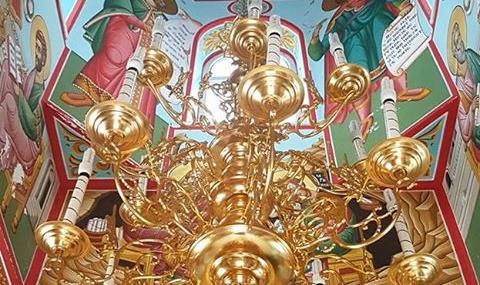St. Andrew was born in Damascus in the 7th century. He was mute until the age of seven. But once, after taking communion with St. Secret, he was miraculously healed. Since then, the boy began to study with great zeal. He especially liked to read the divine books. When he turned 14, his parents took him to Jerusalem. There, St. Patriarch Sophronius accepted him into the church clergy. Andrei led the strictest life. Everyone loved him for his meekness and virtues. During his time the Arameans captured Jerusalem. But even after this sad event, Andrei remained living in the holy city.
In 680, the Sixth Ecumenical Council against the Monothelite heresy was convened in Constantinople. The Monothelites recognized in Christ a divine will. With this, they perverted the Holy Gospel, which recognizes the Lord Jesus Christ as both God and man. The false teaching was condemned by the council. St. Andrew was among the most zealous defenders of the Gospel truth. The Patriarch of Jerusalem sent him to the council, because Andrew, already an archdeacon, was too famous for his wide knowledge of the Holy Scriptures, for his great piety and deep wisdom.
After returning from Jerusalem after the conclusion of the council, Andrew devoted himself to prayer and God-pleasing works. He cared for the poor, the stranger, and the sick, and served all with zeal and love. After some time he was appointed archbishop of the island of Crete. He wisely ruled his flock, teaching them by edifying word and good example. During his reign, the island of Crete was invaded by Saracens. Andrei constantly prayed to God to preserve his faithful children. The Saracens retreated. The grateful Christians attributed this to the fervent prayers of their archbishop Andrew.
Once Andrei was called to Constantinople on church matters. On the way back he foresaw his imminent death and told his companions that he would never see Crete again. Indeed, having reached the island of Mytilene, Andrew fell ill and quietly gave up his soul to God. This was around 720 St. Andrey of Crete left several works with spiritual content: discourses on various holidays, canons and holiday verses. The Great Canon of St. Andrew of Crete is especially famous. It is read in parts on the first four days of Lent, and the whole is read on Wednesday of the fifth week of Lent. Deep repentance and spiritual contrition for sins are expressed in these worship songs.
This Great Canon was brought by St. Andrew to Constantinople together with the narrative of the life of St. Mary of Egypt, written by the Jerusalem Patriarch Sophronia. Then these two creations were included in the Great Lent service.
